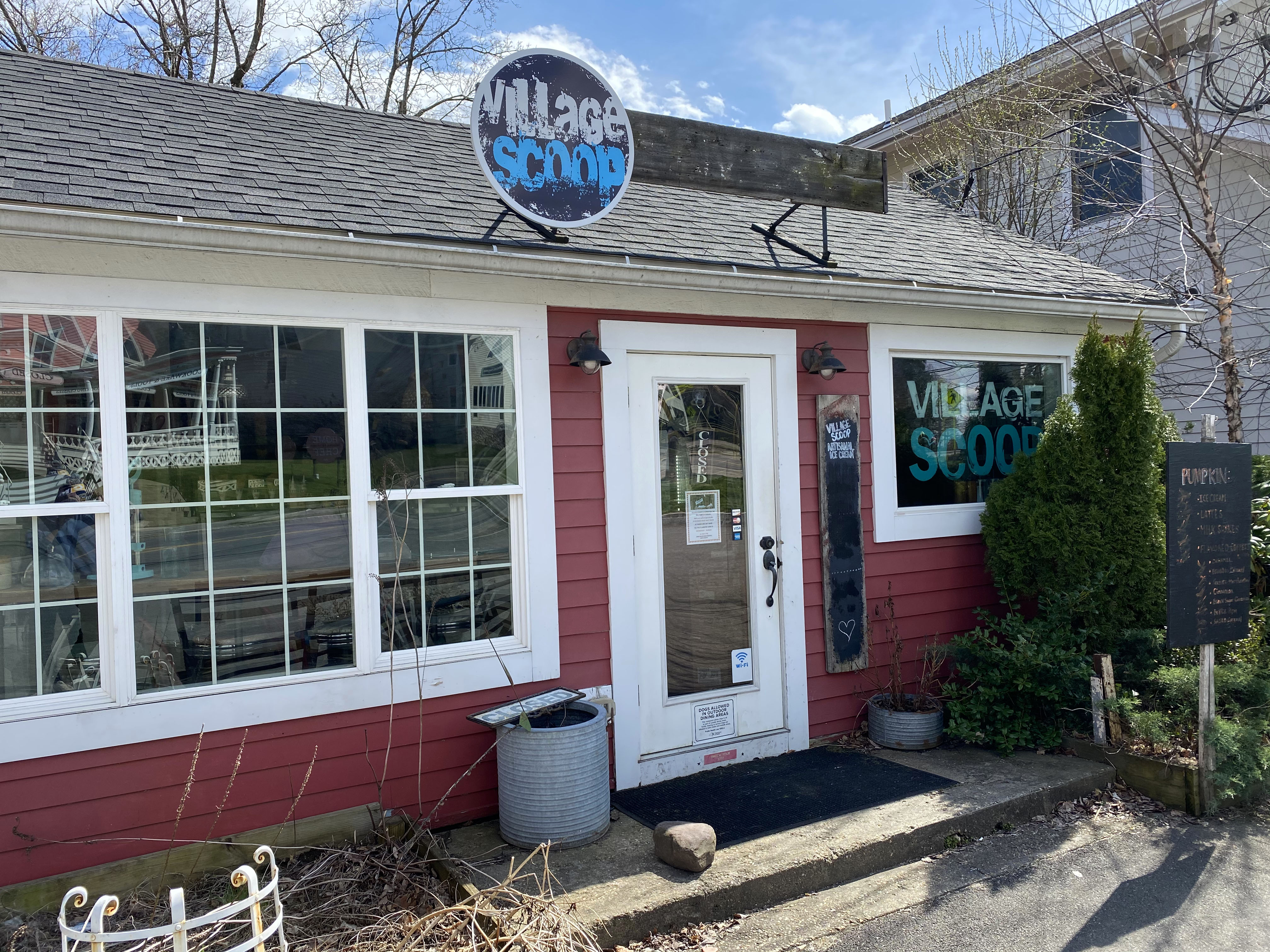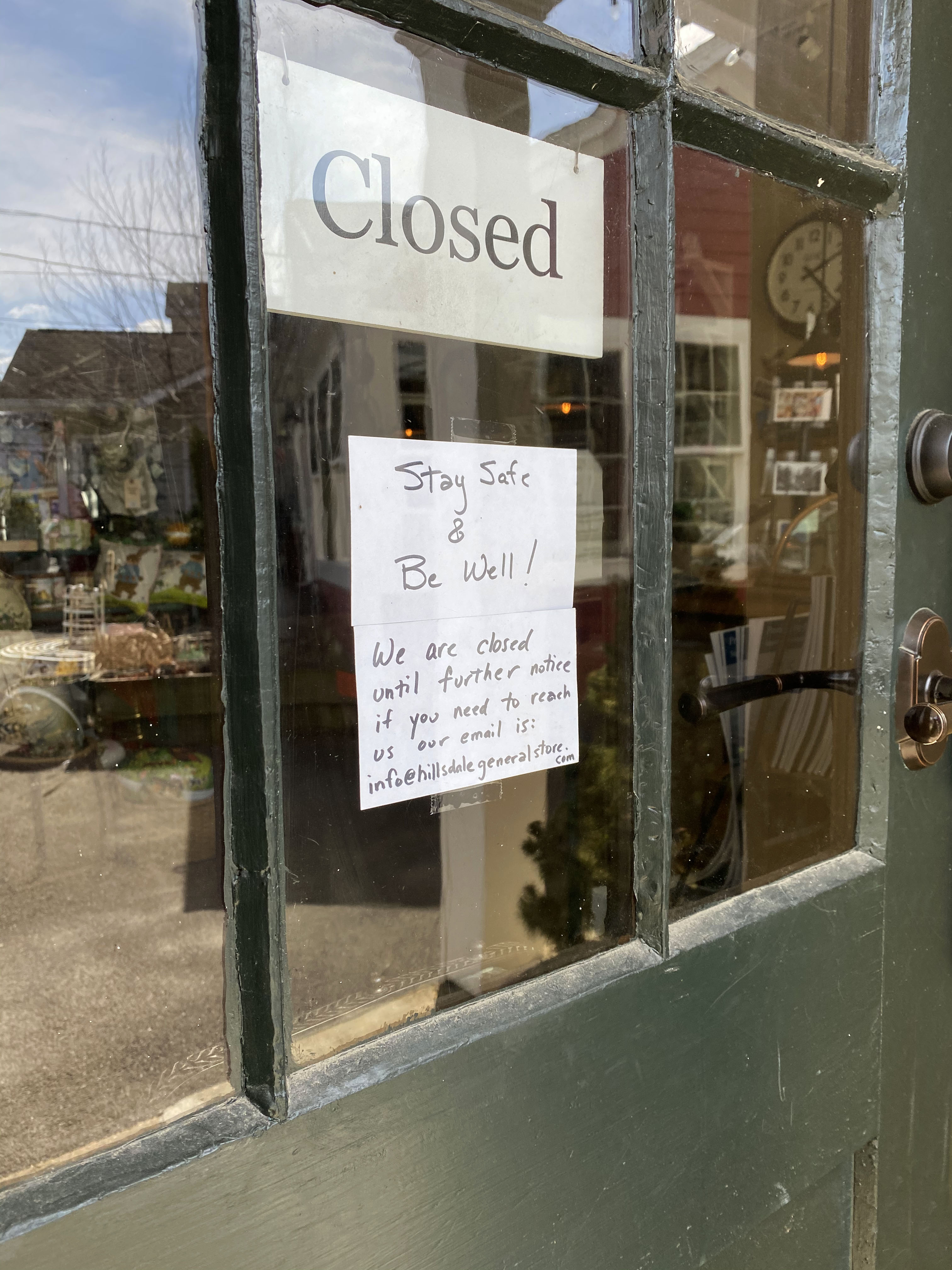
Village Scoop, a favorite ice cream shop in Hillsdale, is just one of many small businesses closed due to COVID-19.
By Quinn Humphrey
A ghost town in the Berkshire Mountains: This is what Hillsdale, New York has become.
On a walk down its main street, I see a total of three people, a few cars and lots of boarded-up shops. Only a handful of businesses are still open. The only people out of their cars are those pumping gas or buying a snack. Nearly everyone wears a protective mask and keeps a safe distance from each other.
Two months ago, Hillsdale was a very different place, [a small, picturesque town where local farmers and unique, family-run shop owners mingled with tourists and vacationers. I’ve been coming here every summer since I was a kid.]
But with New York locked down and a serious outbreak of COVID-19 in the nearby town of Great Barrington, Massachusetts, Hillsdale has transformed into a nearly unrecognizable community.
Hillsdale is a town that reawakened in recent years, says Hillsdale Town Supervisor Peter Cipowski. So the pandemic has been “devastating for small businesses. They’re all very different from each other in terms of the financial strain on them. I think we can be certain that each business is very concerned about when they’re going to be able to re-emerge and what that will look like.”
Cipowski has faced immense pressures from local citizens looking for answers and how to deal with the outbreak. Because of his position on the town board, Cipowski is given information straight from county executives and has been posting updates on a Facebook group he created.
“I issue daily updates on the Hillsdale Facebook page, which is not an official town page, but more of a community page,” Cipowski said. “I typically post once a month, on the first day of the month, but since COVID happened I’ve been doing it every five or six days or so just to update folks about the goings-on.”
Small businesses are the lifeblood of Hillsdale, and the town doesn’t know what the future will hold.

The Hillsdale General Store is one of the many small businesses within Hillsdale whose future is uncertain.
As I enter the local IGA supermarket, I stop and take note of the people around me. Outside is practically empty, yet inside this tiny supermarket are about fifteen people all clamoring to get in and out as quickly as possible.
When I turn the corner on one of the aisles, I spot a worker stocking shelves with a variety of goods at his feet. He’s wearing black overalls with the supermarket logo on them, thick black gloves that extend to the middle of his forearm and a black baseball cap. No face mask, no bandanna. A woman walks towards him, tries get by, and he quickly presses himself against the walls of the aisle to make room for her.
He seems flustered. Most importantly, he seems scared. He fumbles a can of something on the floor and quickly puts it back in his box of items before anyone notices.
When I approach him to talk, he tries to maneuver out of the way again. Yet, as I begin to speak to him his gaze fixes on me, with his green eyes and bushy upstate NY beard. I keep my distance, following guidelines, but he’s clearly uncomfortable. To make the encounter less robotic, I move closer, but he moves back, keeps his distance. I ask questions he doesn’t know how to answer. He tells me his name is Ryan Havlik and that he’s very concerned about what has been happening.
“The little shops, especially the one-man businesses, are really hurting and it really comes down to one store trying to hold the whole town up,” Havlik said. He tells me that items in the store, such as toilet paper and paper towels, have been constantly sold out. He then returns to his work and tells me to be safe.
Nearby, Cathy Grant is shopping for produce. She’s wearing thick rubber gloves and an N-95 mask covering her face. Her grey hair contrasts with her black windbreaker. The apples she is looking at seem to fascinate her. She’s lived in Hillsdale for the past four years, she says, and has come to love the Berkshire area and most of Columbia County. I eventually get around to the coronavirus outbreak.
“To me the biggest impact of all of this is fear,” Grant says. “What is the biggest purpose of this fear? Why is it being proliferated? And questions I ask further: Do I believe this virus is what people think it is? Is it possibly something else? There may be more to it than meets the eye. Does it mean the military is gonna come in? What’s really going on? I may live in Hillsdale, but I ain’t stupid.”
What have I started, I wonder.
“I’m gonna say start investigating 5G,” she goes on. “Look at 5G radio-frequency. Look where it has been implemented. What countries did they launch in? Where have these worst cases of COVID been happening?”
As I leave the grocery store, I walk into a Fine Wine and Spirits store that has an open sign on its front door. The woman working the register when I walk in eyes me up and down, probably assuming that I am underage, there to buy alcohol. The store is covered wall-to-wall with wine bottles. The hardwood floor with tall ceilings give the place a rustic, yet modern appeal. [Typical of Hillsdale?]
I wander back to the office, where I meet Nikki Ramos, the owner and manager. With her colorful jewelry and brightly lit office, Ramos gets right to the point.
COVID has been great for her business. Usually, she sees a big uptick around holidays such as Thanksgiving, she says, but “our sales have gone up about 50% since all of this has started.” All business, Nikki checked her phone and said her goodbyes.
As I walk back to my car, the quiet roadside markets and empty artisan shops make an eerie sight. The little town of my childhood summers—fun, vibrant, full of life—has been hollowed out.
With all the challenges the world is facing right now, you try to survive COVID-19 and come out stronger on the other side. Personally, I’m pulling for Hillsdale.
